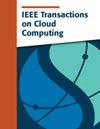Efficient Verifiable Cloud-Assisted PSI Cardinality for Privacy-Preserving Contact Tracing
IF 5
2区 计算机科学
Q1 COMPUTER SCIENCE, INFORMATION SYSTEMS
引用次数: 0
Abstract
Private set intersection cardinality (PSI-CA) allows two parties to learn the size of the intersection between two private sets without revealing other additional information, which is a promising technique to solve privacy concerns in contact tracing. Efficient PSI protocols typically use oblivious transfer, involving multiple rounds of interaction and leading to heavy local computation overheads and protocol delays, especially when interacting with many receivers. Cloud-assisted PSI-CA is a better solution as it relieves participants’ burdens of computation and communication. However, cloud servers may return incorrect or incomplete results for some reason, leading to an incorrectness issue. At present, to our knowledge, existing cloud-assisted PSI-CA protocols cannot address such a concern. To address this, we propose two specific verifiable cloud-assisted PSI-CA protocols: one based on a two-server protocol and the other on a single-server protocol. Further, we employ Cuckoo hashing to optimize these two protocols, enabling the receiver's computational costs independent of the size of the sender's set. We also prove the security of the protocols and implement them. Finally, we analyze and discuss their performance demonstrating that the single-server verifiable PSI-CA protocol does not introduce significant computation or communication costs while adding functionalities.用于保护隐私的联系人追踪的高效可验证云辅助 PSI Cardinality
隐私集交集万有引力(PSI-CA)允许双方在不透露其他额外信息的情况下了解两个隐私集之间的交集大小,是解决接触追踪中隐私问题的一种有前途的技术。高效的 PSI 协议通常使用遗忘传输,涉及多轮交互,导致严重的本地计算开销和协议延迟,尤其是在与许多接收方交互时。云辅助 PSI-CA 是一种更好的解决方案,因为它减轻了参与者的计算和通信负担。但是,云服务器可能会因为某些原因返回不正确或不完整的结果,从而导致不正确性问题。目前,据我们所知,现有的云辅助 PSI-CA 协议无法解决这一问题。为了解决这个问题,我们提出了两个具体的可验证云辅助 PSI-CA 协议:一个基于双服务器协议,另一个基于单服务器协议。此外,我们还利用布谷鸟散列优化了这两个协议,使接收方的计算成本与发送方集合的大小无关。我们还证明了协议的安全性并实现了它们。最后,我们对它们的性能进行了分析和讨论,证明单服务器可验证 PSI-CA 协议在增加功能的同时不会带来显著的计算或通信成本。
本文章由计算机程序翻译,如有差异,请以英文原文为准。
求助全文
约1分钟内获得全文
求助全文
来源期刊

IEEE Transactions on Cloud Computing
Computer Science-Software
CiteScore
9.40
自引率
6.20%
发文量
167
期刊介绍:
The IEEE Transactions on Cloud Computing (TCC) is dedicated to the multidisciplinary field of cloud computing. It is committed to the publication of articles that present innovative research ideas, application results, and case studies in cloud computing, focusing on key technical issues related to theory, algorithms, systems, applications, and performance.
 求助内容:
求助内容: 应助结果提醒方式:
应助结果提醒方式:


